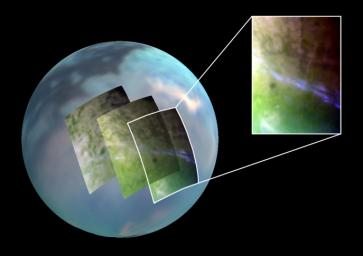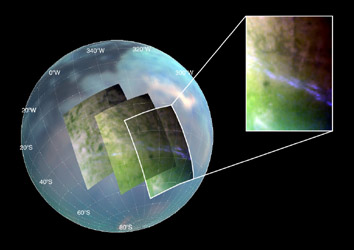
|
Titan’s Lingering Clouds
- Click the image above for a larger view
- Full-Res JPEG (1188 x 838) (56.1 kB)
- Full-Res TIFF (1188 x 838) (3.0 MB)
Caption:
Lots of clouds are visible in this infrared image of Saturn's moon Titan. These clouds form and move much like those on Earth, but in a much slower, more lingering fashion, new results from NASA's Cassini spacecraft show.
Scientists have monitored Titan's atmosphere for three-and-a-half years, between July 2004 and December 2007, and observed more than 200 clouds. The way these clouds are distributed around Titan matches scientists' global circulation models. The only exception is timing—clouds are still noticeable in the southern hemisphere while fall is approaching.
Three false-color images make up this mosaic and show the clouds at 40 to 50 degrees mid-latitude. The images were taken by Cassini's visual and infrared mapping spectrometer during a close flyby of Titan on Sept. 7, 2006, known as T17. For a similar view see PIA12005 .
Each image is a color composite, with red shown at the 2-micron wavelength, green at 1.6 microns, and blue at 2.8 microns. An infrared color mosaic is also used as a background (red at 5 microns, green at 2 microns and blue at 1.3 microns).
The characteristic elongated mid-latitude clouds, which are easily visible in bright bluish tones (see close-up in the inset) are still active even late into 2006-2007. According to climate models, these clouds should have faded out since 2005.
Scientists will continue to observe the long-term changes during Cassini's extended mission, which runs until the fall of 2010.
Background Info:
The Cassini-Huygens mission is a cooperative project of NASA, the European Space Agency and the Italian Space Agency. The Jet Propulsion Laboratory, a division of the California Institute of Technology in Pasadena, manages the mission for NASA's Science Mission Directorate, Washington, D.C. The Cassini orbiter was designed, developed and assembled at JPL. The Visual and Infrared Mapping Spectrometer team is based at the University of Arizona, Tucson.
For more information about the Cassini-Huygens mission visit http://saturn.jpl.nasa.gov/home/index.cfm . The visual and infrared mapping spectrometer team homepage is at http://wwwvims.lpl.arizona.edu .
Cataloging Keywords:
| Name | Value | Additional Values |
|---|---|---|
| Target | Titan | |
| System | Saturn | |
| Target Type | Satellite | |
| Mission | Cassini-Huygens | |
| Instrument Host | Cassini Orbiter | |
| Host Type | Orbiter | |
| Instrument | Visual and Infrared Mapping Spectrometer (VIMS) | |
| Detector | ||
| Extra Keywords | Atmosphere, Color, Infrared | |
| Acquisition Date | ||
| Release Date | 2009-06-03 | |
| Date in Caption | ||
| Image Credit | NASA/JPL/University of Arizona/University of Nantes | |
| Source | photojournal.jpl.nasa.gov/catalog/PIA12004 | |
| Identifier | PIA12004 | |

